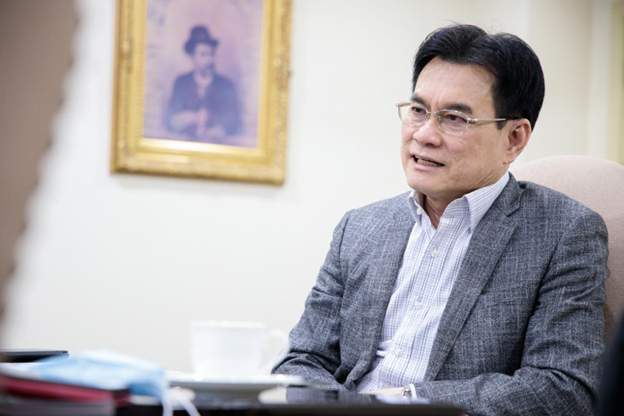

(Written by Dulyapaween Kronsaeng / Translated by Mo Tingting)The trade and economic cooperation between China and Thailand acts as a vital part of bilateral relations. Since 2020 marks the 45th anniversary of diplomatic relations between China and Thailand, H.E. Mr. Jurin Laksanawisit, Deputy Prime Minister and Minister of Commerce of Thailand gave an interview with TAP. He indicated that now the bilateral relations between China and Thailand are developing vigorously with closer cooperation in various fields, and economic performance is particularly prominent.

From 2010 to 2019, bilateral trade volume grew at an average annual rate of 6.3%. China and Thailand have set a goal of increasing bilateral trade to US$ 140 billion by 2021. China became Thailand’s largest trading partner in 2019, accounting for 16.5% of the country’s total international trade. Thailand is China’s 14th largest trading partner, accounting for about 2% of China’s total international trade. While many achievements have been made, the potential of China-Thailand economic and trade cooperation is still being unleashed.
RCEP to expand China-Thailand economic and trade cooperation
“Various forms of economic and trade cooperation between China and Thailand, including trade, investment, the establishment of cooperation mechanism and economic and trade cooperation framework such as Lancang-Mekong Cooperation mechanism, China-ASEAN Free Trade Area (CAFTA), etc., have enhanced regional economic and trade cooperation between China and ASEAN, and substantially facilitated a greater open market between China and Thailand,” said Jurin.
He also mentioned that the bilateral trade cooperation under the framework of the RCEP will inject new impetus into both sides’ economies. The review of RCEP’s legal documents is expected to be concluded soon so that the agreement can be signed by the parties in November 2020.
RCEP is conducive to expanding Thailand’s economic, trade and investment exchanges with other member states, including China, Thailand’s largest trading partner. Meanwhile, it can also fuel the sustainable economic growth of Thailand and even ASEAN, generate greater cooperation potential and development room based on the open market under China-ASEAN Free Trade Agreement, and help Thai products, such as TV sets, automobile equipment, rubber, vegetables and fruits, etc., enter the global market.

On the one hand, RCEP will also bring opportunities for Thai enterprises with local characteristics to invest in China in such fields as health care, automobile, film and television, entertainment and animation production. On the other hand, industrial sectors in Thailand are expected to attract more foreign investment to push forward their development.
Pragmatically promote economic and trade cooperation at the provincial level
Regarding policies to promote China-Thailand economic and trade cooperation, Jurin said that Thailand’s Ministry of Commerce will promote the establishment of counterpart economic and trade cooperation relations between Thailand and many provinces in China, formulate policies based on the development policies of various Chinese provinces, and promote trade development consistent with the needs of each province. For example, China regards Guangxi as a frontier gateway to ASEAN, Thailand thinks of Guangxi as a gateway and an important distribution center for the export of Thai fruits, while Yunnan serves as one of the gateways to the western Chinese market.
Hainan is a special economic zone highly valued by China, being the ancestral home of many overseas Chinese in Thailand. As such, the Ministry of Commerce of Thailand is seeking breakthroughs in cooperation and promoting special agreements between the two sides to further deepen the partnership between Thailand and Hainan. “Thailand attaches great importance to promoting cooperation with China’s provinces. The multi-level exchange of visits and exchanges between the two countries, as well as various provincial-level trade fairs, will help broaden channels and opportunities for cooperation between the two countries,” said Jurin.
Ride out the epidemic through online trades
Economic and trade cooperation between China and Thailand has been more or less disturbed by the COVID-19 since 2020. Bilateral trade volume between the two countries from January to April in 2020 reached US$ 25.299 billion, with a 1.48% increase year-on-year.
On dealing with the challenge of the epidemic to economic and trade cooperation of China and Thailand, Jurin indicated that the epidemic made brick-and-mortar enterprises much more difficult, which caused changes in consumer behaviors. Therefore, online trades became a “new normal” in the post-COVID-19 era, as well as an important channel for China’s consumer groups.
Lately, the Ministry of Commerce of Thailand cooperated with Tmall, an online shopping mall of China’s Alibaba, and established the “TOPTHAI Flagship Store” on Tmall. TOPTHAI Flagship Store sells products of Thai characteristics, such as foods (fruits, processed fruits, canned foods, snacks and drinks), furnishings (latex pillows and home ornaments) and fashion products (clothes, bags and shoes).

Jurin said, “It was my first experience of marketing via live streaming in this year’s 6.18 Mid-Year Shopping Festival, and I recommended high-quality Thai fruits and foods to the Chinese audience. The live streaming video, watched over 16 million times in only 15 minutes, was a big hit. We must extend thanks to the Tmall, which makes Thai products better known by Chinese consumers, and informs Chinese consumers that quality Thai fruits are accessible through Tmall. It not only contributes to marketing, but also makes it more convenient for Thai products to enter the Chinese market.”
It is reported that in order to stimulate consumption, the Ministry of Commerce of Thailand has launched promotion activities through famous Chinese online retailers such as Ito Yokado, Tmall, JD, Lotus, Freshippo and Taobao. Besides, the Ministry of Commerce of Thailand will have an online business meeting with Chinese fruit importers, and plan to achieve cooperation on products of other types in the future.
China-Thailand friendship becomes even closer after 45 years
Jurin expressed that China remained an important partner of Thailand since both sides had established diplomatic relations, which has kept a steady and positive momentum. The royal family of Thailand, especially, made a great contribution to the friendship and mutually-beneficial cooperation between the two countries.
Chinese President Xi Jinping awarded Princess Sirindhorn the Friendship Medal, the highest foreign-related honor in China, which was a great honor for Thailand and its people. For a long time, Princess Sirindhorn has been contributing significantly to the cooperation and friendship between China and Thailand.
As a result of frequent visits between both countries’ leaders, the relation between Chinese and Thai people also becomes closer and more harmonious.
Jurin said, “Finally, I sincerely hope that Sino-Thai relations can step towards a higher level, no matter in a political, economic, social or partisan sense. And I hope that through all-round cooperation and development, China and Thailand will join together to create a rosy future.”
Source: Thailand’s TAP
桂ICP备14000177号 Copyright@2006-2013 Guangxi China-ASEAN Panorama Magazine Agency Co., Ltd. All Rights Reserved